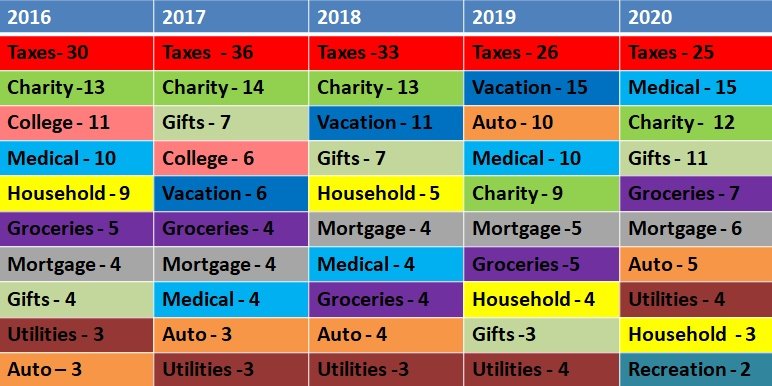I'm 4 years FIRE'ed, DW is working 1.5 more years. We are now (barely) living off her salary and not touching the portfolio.
Today, after a Zoom call with a Fidelity guy, we revisited out budget and took a stab at a "retirement" budget. We made guesses about where we would live (we have some idea) and went through our 2018 budget as a reference. Pulled all sorts of utilities averages out and checked those in.
We boosted the food and beverage budgets a bit (we love fine wines and spirits, and I love to cook) and boosted the dining out budget by 20%. Auto costs we kept the same probably could decrease it, we have 3 cars plus 3 antique ones. Kept cable and cell phones the same and added $1800/mo for healthcare (for until we get to Medicare).
Travel, I'm leaving out of the month by month stuff. We want to do a bunch of it, but I will pull annual lump sums out and it will be a "use it until it is gone type of account".
Anyway, curious about those who have already fully transitioned to a retirement budget, what did you find that increased and what decreased? What did you anticipate and what did you not?
Today, after a Zoom call with a Fidelity guy, we revisited out budget and took a stab at a "retirement" budget. We made guesses about where we would live (we have some idea) and went through our 2018 budget as a reference. Pulled all sorts of utilities averages out and checked those in.
We boosted the food and beverage budgets a bit (we love fine wines and spirits, and I love to cook) and boosted the dining out budget by 20%. Auto costs we kept the same probably could decrease it, we have 3 cars plus 3 antique ones. Kept cable and cell phones the same and added $1800/mo for healthcare (for until we get to Medicare).
Travel, I'm leaving out of the month by month stuff. We want to do a bunch of it, but I will pull annual lump sums out and it will be a "use it until it is gone type of account".
Anyway, curious about those who have already fully transitioned to a retirement budget, what did you find that increased and what decreased? What did you anticipate and what did you not?

